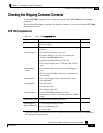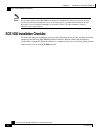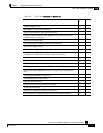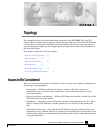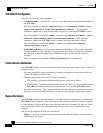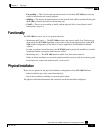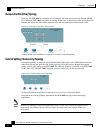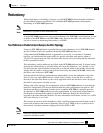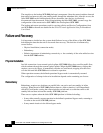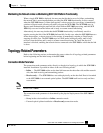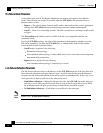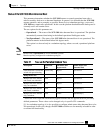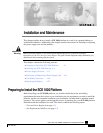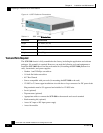
Chapter 3 Topology
Redundancy
Cisco SCE 1000 2xGBE Installation and Configuration Guide
OL-7821-05 3-5
Redundancy
When a high degree of reliability is desired, a second SCE 1000 Platform should be installed to
provide backup operation capabilities. This redundant SCE 1000 guarantees uninterrupted
functioning of all SCE 1000 operations.
Note
Redundancy is possible in inline installations only.
A single SCE 1000 platform does not provide redundancy for SCE 1000 control functions. In case
of failure of the SCE 1000 unit, the SCE 1000 simply bypasses the traffic; the traffic link is not
cut, but no control or monitoring functionality is available.
Two Platforms on Parallel Links in Bump-in-the-Wire Topology
Using two SCE 1000 platforms on parallel links provides redundancy for all SCE 1000 features.
In case of failure in the active platform, the backup SCE 1000 unit takes over.
Using redundant SCE 1000 platforms is applicable as an overlay to a customer’s redundant
topology, on condition that the entire traffic of a specific subscriber (end station, subnet or
VLAN) is flowing through one link only. Both links may be active, providing that the subscriber
traffic is mutually exclusive.
This redundancy solution addresses any failure in the SCE 1000 platform itself. It is based on the
idea that any fatal hardware or software failure will cause the platform to “cut” the link. A “cut”
link will cause the routers/switches on both ends to switch the traffic to the standby link. On the
standby link, the traffic is analyzed and policies enforced by the standby SCE 1000, which, after
the failure, acts as the active SCE 1000.
Note that when both links are simultaneously independently active and redundant for the other
link (as is the case when HSRP with two virtual routers is used), if one link fails, its traffic is
directed to the other link. However, the overall supported load in the link that is now carrying all
the traffic is only equal to one link, not two.
During setup of this topology, the configuration of the two SCE 1000 platforms is done through
multi-box configuration. This ensures that both hold the same configurations and policies. The
functional operation of switching from the active to standby, SCE 1000 is contingent upon the
fact that the two SCE 1000 platforms are in the same Domain. All configurations performed on
this Domain are automatically updated on both SCE Platforms. Both boxes should also be
assigned to the same Subscriber Domain. For more information on Domains, see the Cisco SCMS
Subscriber Manager User Guide.
The common protocols used for redundancy traffic switching between network elements such as
routers and switches in networks are Spanning-Tree in layer2, HSRP in layer3 (usually used in
data-centers), and other common routing protocols like OSPF or RIP.
Note
When using routing/switching protocols that perform load balancing as well, the load balancing
capabilities should be disabled.



